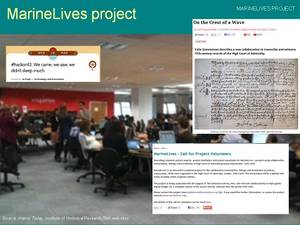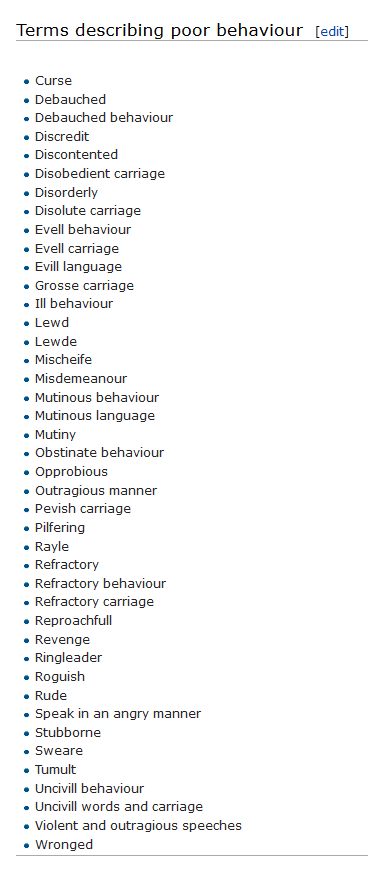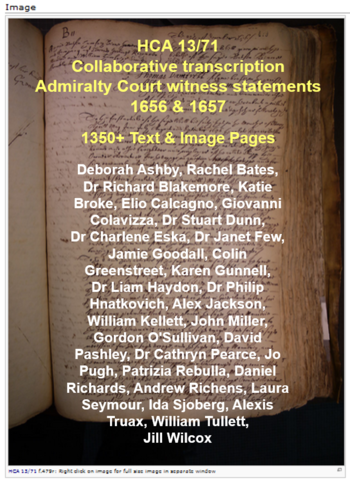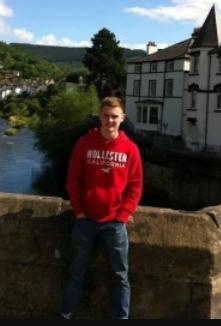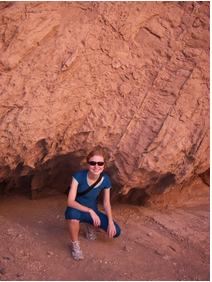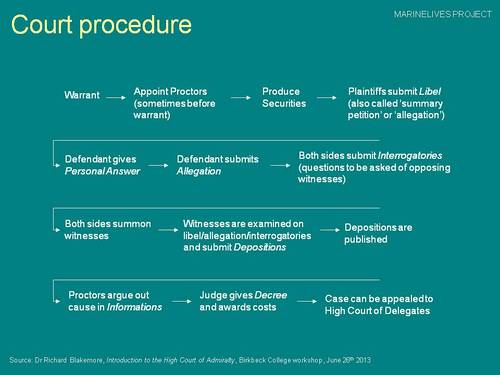MarineLives
Contents
Welcome to the MarineLives project
The MarineLives collaborative public history project was established in 2012 to digitise, transcribe and annotate the manuscript records of the English High Court of Admiralty from the 1650s and 1660s. The original records are held at the National Archives in Kew.
The project is led and advised by academics and members of the general public.
In the last three years project volunteers have transcribed over 3 million words and 6000 pages of Admiralty Court records.
To learn more or to volunteer please contact us
MarineLives wiki invited to participate in UK Web Archive
The six week old MarineLives wiki, product of our three year old project, has been invited to participate in the UK Web Archive. The purpose of the archive is to represent aspects of UK documentary heritage for researchers in the future.
Not bad for a six week old wiki - product of the three years old MarineLives project!
Curses, debauchery, mutiny and revenge
Seventeenth century seamen of all nationalities were a boisterous lot, especially when "in drink". We have had some fun collecting some of the words used to describe poor behaviour, together with some of the rich language used amongst seamen.
We invite you to read about the Danish general's captain who told an English master of a ship that hs letters of marque were "good for nothing but to wipe his breeche with" (HCA 13/72 f.218v) and another English master who was alleged "in an outragious manner" to have reviled the merchants' factor calling him "old Roague and old Pedler and old Pimpe and the like disgracefull names" (HCA 13/73 f.3r)
For more examples click here.
Take a look too at a disciplinary code drawn up in 1647 by the master of the Mayflower, an English ship engaged in the slave trade.
Our readership
Our new MarineLives wiki went live eight weeks ago on Wednesday May 27th. The wiki has 17329 pages and 6920 manuscript images.
In the last thirty days we have had 1675 users, 2059 sessions and 6381 page views. A user in an average session looks at 3.1 pages in a session lasting two minutes fifty seconds.
Since launch of the MarineLives wiki we have had 2790 users, 3430 sessions and 10355 page views. A user in an average session has looked at 3.0 pages in a session lasting two minutes and twenty nine seconds.
Since we launched our beta of the MarineLives wiki on April 20th 2015 we have had 3409 users, 4165 sessions and 12152 page views. A user in an average session has looked at 2.9 pages in a session lasting two minutes twenty three seconds.
Our latest transcription challenge
HCA 13/124 is a volume of Personal Answers submitted in the English High Court of Admiralty in the years 1650 to 1652. The original manuscripts are held at the National Archives, Kew, England.
A complete set of digital images is available on this wiki, together with transcriptions of the first eighty six folios.
We are currently looking for volunteer transcribers to work with us to finish the transcription of this volume. Volunteers will be supported by an experienced trained facilitator. Novice and experienced transcribers are equally welcome.
Please contact us to learn more about working as a volunteer to complete HCA 13/124.
Introducing our content
HCA 13/71 is a volume of witness statements or depositions submitted in the English High Court of Admiralty in the years 1656 and 1657. The original manuscripts are held at the National Archives, Kew, England.
This volume was transcribed between September 2012 and March 2013 by a team of volunteer transcribers working on the MarineLives project. Full text semi-diplomatic transcriptions of the full volume are published on this wiki with associated digital images from the original manuscript volume.
Click here to access the text and images
Click here for an alphabetical list of deponents
Click here for a geographical list of deponents
Our team based transcription programmes
We run regular team-based transcription programmes on-line, facilitated by trained team leaders, with teams of three or four volunteer associates. These programmes last twelve weeks, and will take a transcriber from a novice to a confident transcriber in that space of time.
Please contact us to discuss volunteering, or to explore how we might work with your University, School or Local History Society.
Thomas Davies is a third year history undergraduate student currently studying at Bath Spa University. In the summer of 2014, Thomas was a member of a four person virtual team of volunteers transcribing Admiralty Court witness statements from 1658 to 1660, facilitated by Dr. Philip Hnatkovich in Pennsylvania:
"There were some challenging aspects of the programme — the main being distance. This was because we worked as a team and half of the team were based in the United Kingdom and half were based in the United States, so we had to be aware of time differences and that we would be unable to meet in person.
To combat this we used email, Google Hangouts, and Skype and made good use of all the resources available to stay in touch when working on the documents together. We had weekly calls to discuss team business. The weekly calls helped because we would talk about the problems or issues we faced weekly and how the transcriptions were to be presented covering topics such as layout or abbreviations.
The biggest challenge I faced in the transcription itself was becoming accustomed to the peculiar writing and distinguishing letters. Some letters look very similar, such as f’s and s’s, r’s and c’s not to mention t’s and l’s. I began transcribing effectively by taking it slow and working out the letters individually instead of looking at the word as a whole as we do with modern writing. I found this approach to be very effective.
MarineLives created a Bath Spa student section that helped me significantly, showing templates of letters and the different forms they have. This allowed me to tackle the many different writing styles the clerks used. Once I was able to distinguish between letters more clearly with considerable practise, I found I could transcribe enough of the page to get a good idea of what was being said in the documents. Then, I could alter words that did not fit within the context of the deposition, or using the context as a guideline as to what certain words should be."
Katherine Parker is a Ph.D. candidate at the University of Pittsburgh. She is currently writing her dissertation entitled “Toward a more ‘perfect knowledge': British geographic knowledge and South Seas exploration in the eighteenth century. She participated in the MarineLives Ph.D. forum in 2013, and the MarineLives summer programme in 2014:
"On summer research trips to London in 2011 and 2012, I had looked at a few HCA documents and knew that the cases recorded in them offered rich material for social, economic, and naval history. Over the course of several skype meetings, I and other PhD students got to give our opinions about the proposed platform and methodology for transcription. Working with a team created a strong community aspect to the project from the beginning; I have always been impressed by the inclusiveness and openness that drives MarineLives. Also, it was refreshing to have my opinion valued as a PhD student, as sometimes that stage in one’s education is isolating and transitional—you are not yet qualified as an expert, but also not unknowledgeable about certain fields.
The value MarineLives placed on the voices of the PhD forum made me want to participate further, even though the works being transcribed were not strictly within the chronological bounds of my dissertation project. Thus, when the summer transcription project was created, I jumped at the opportunity to use paleographic and transcription skills I had gained after a year in London archives on a Social Sciences Doctoral Dissertation Fellowship (2013-14).
Writing styles change over time, just like clothing and furniture styles. Thus, the letters inscribed within HCA volumes from the mid-seventeenth century posed a challenge for me, as I am used to the fluid, upright cursive (often written by a trained scribe or clerk) of the mid-eighteenth-century Admiralty. I came to enjoy the challenge of squinting at the digital pages in front of me, willing the words to make sense, filling in paragraphs slowly until suddenly they all made sense."
The Court records
Click here for full listing of Admiralty Court records within scope of MarineLives project
The English High Court of Admiralty produced a wide range of documents.
The various steps in a particular case can be followed in summary form in the Acts of Court.
A case was commenced with the issuing of a Warrant by the Court, and the preparation of a Libell or an Allegation by the party commencing the case.
Prior to witnesses being called to make their depositions, the defendant or "respondent" might make a Personal Answer in response to the Libell or Allegation.
The most accessible of the court records are the statements made by witnesses, which are called Depositions. These depositions were in response to written Interrogatories, which were prepared by both plaintiffs and defendants in a case.
Various written documents were submitted by plaintiffs and defendants, as well as witnesses, during a court case. Some of these have survived as loose documents in the Instance Papers.
Many cases were settled prior to the giving of a formal verdict or Sentence. For those cases which went to sentence, the sentences can be found in document bundles. These bundles often include bills of expense related to the case, and in some cases include copies of the allegations or libells, and other miscellaneous documents.
